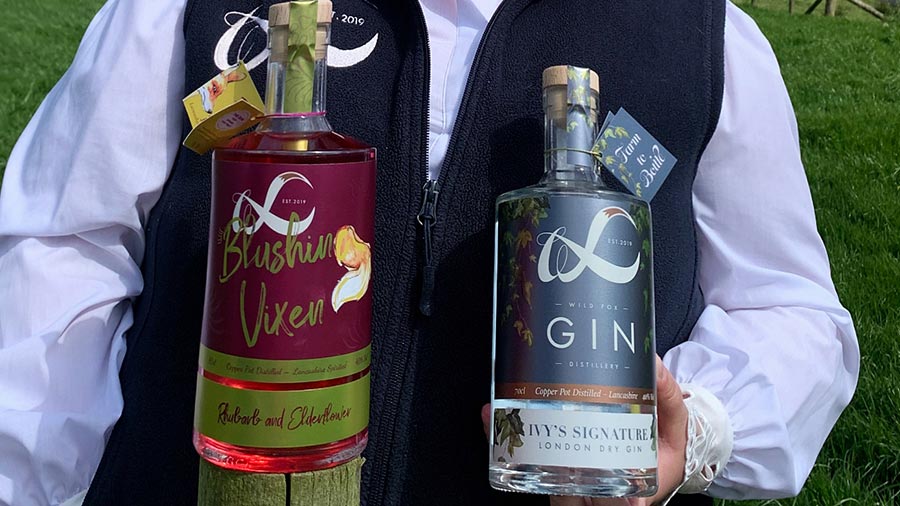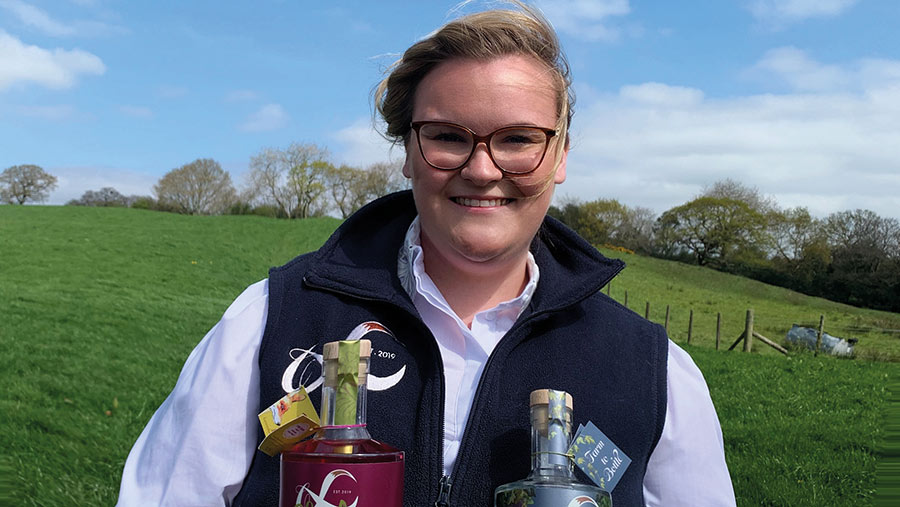How dairy farm added gin production to business portfolio
 © Lizzie Butler-Billington
© Lizzie Butler-Billington Food and drink makers from across the country will be exhibiting their delicious wares at the Game Fair later this month.
Farmers Weekly chats with Lizzie Butler-Billington of Wild Fox Gin Distillery.
See also: Farmers Weekly Awards 2021 – Diversification Farmer of the Year
What prompted you to diversify in 2019?
It was an attempt to put my product development passion and skills to good use and create a product that represented the farm’s heritage without compromising its natural beauty.
There is also a growing new generation on the farm and it’s good for our children to experience a new business and be brought up with opportunities to suit different personalities, should they want them.
We see it as a new enterprise rather than a diversification as the farm business is solid and neither business financially benefits from the other.

Lizzie Butler-Billington © Wild Fox Gin
Why gin, though?
We’ve always loved a good G&T. The problem was that we found our staple gin was becoming more and more mediocre and the flavours were decreasing over the years.
So we went on a hunt for more artisanal gins, but were disappointed that most recommended serving with a garnish or flavoured tonic, and we just wanted a gin that spoke for itself and needed nothing adding.
This initially sparked the idea of distillation. With the wealth of botanicals already growing in the field, orchard, hedgerows and having our own water source, it really was a no-brainer.
How do the dairy farm and the gin business dovetail? What are the synergies and challenges of running the two together?
We work in perfect harmony – most of the time. The distillery is carefully positioned – on the farm, but nestled in a way that means visitors can enjoy the views and watch working practices without disrupting them.
Our biggest challenge is “sharing” my husband, Rob – he is a partner in the distillery, but still very active on the farm and key when it comes to field work, so he can disappear for weeks on end.
You say you ‘strive to embody the farm’s heritage in every bottle’. How do you do that?
Our family have owned and worked the farm since 1932. The farm’s orchard has fruit bushes, planted on day one by my great-grandparents, which we now harvest and use in our signature and summer editions.
We add a wealth of common “weeds” that the field sides have to offer and hawthorn from our hedgerows plays a key role in each of our distillations. Essentially, there is small part of our farm in each bottle.
How competitive is the gin market?
There’s competition in every business. That’s why you need a strong and, above all, completely truthful unique story when creating and selling your own.
The gin market is flooded – not so much with distillers, more with brands using synthetic flavours.
We are super-transparent about everything we do; that’s why we welcome people here to see where and how our gin is crafted.
With any start-up, the key is to be totally honest with your customers and, when you grow, ensure you stick to your values and share the details of your journey.
What’s been the high point?
Winning the “national best drinks business” category of the Rural Business Award in 2021. It was a huge boost.
What’s been the low point?
The biggest challenge has been the Covid-19 pandemic. We lost 60% of our customers overnight because initially we were very focused on the hospitality outlets and obviously they were all lost.
What doesn’t kill you makes you stronger, though – so it made us adapt quicker and we learned a hard lesson about not putting all our eggs in one basket.
Is it a capitally intensive diversification?
Yes, but we started small and as we grew and got a solid customer base we built the new distillery and visitor centre.
Day-to-day running costs are high – spirits in general are expensive to craft because the duty is exorbitant. We also only use British ingredients, which has a higher cost, but it’s absolutely worth it.
What one piece of advice would you give to a farmer considering diversifying?
Ensure you have identified a key person to take charge of that new business and allow that person to focus on it rather than giving them other responsibilities that take them away from it.
Also, remain true to your first customer, visitor or consumer – remain the reason they chose your business.
Taking your product to shows must be a good way of engaging with the public – why is this important?
We always ensure we make time to be present at events, share our passion and hope that, in turn, we will gain some new fans. It’s impossible to simply chat about your business and products in the same way using e-marketing, social media platforms or the media.
What are you looking forward to seeing at the Game Fair?
The highlight is being part of the huge celebration of the great British countryside and having all those like-minded folk in one place.
We’ve always attended the Game Fair, even before becoming exhibitors, for the buzzing atmosphere.
With the ever-increasing negativity in the press, it’s so refreshing to have pure positivity from all ages enjoying country pursuits, food and drink.
The Game Fair
The Game Fair, taking place from 29-31 July at Ragley Hall, Warwickshire, is “the festival of the British countryside for the whole family”.
Attractions include everything from Gunmakers’ Row to a programme of debates on topical rural issues.
Find out more at thegamefair.org
